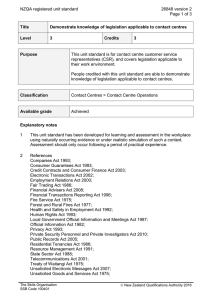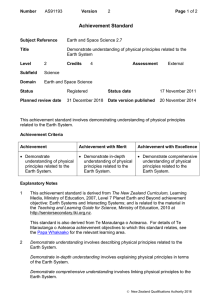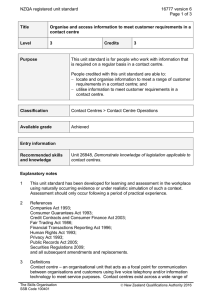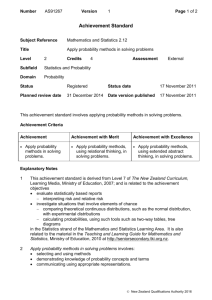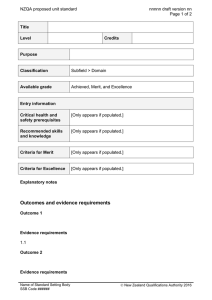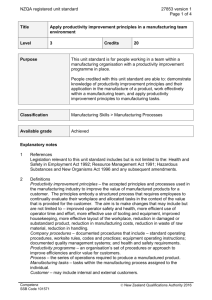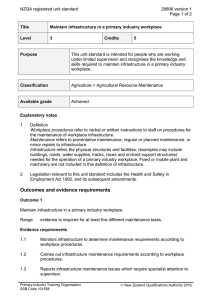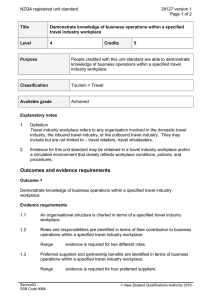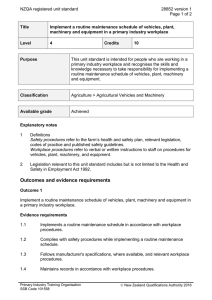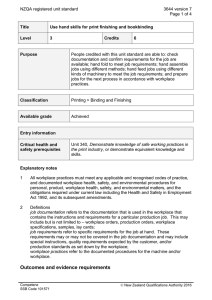NZQA registered unit standard 16778 version 6 Page 1 of 4
advertisement
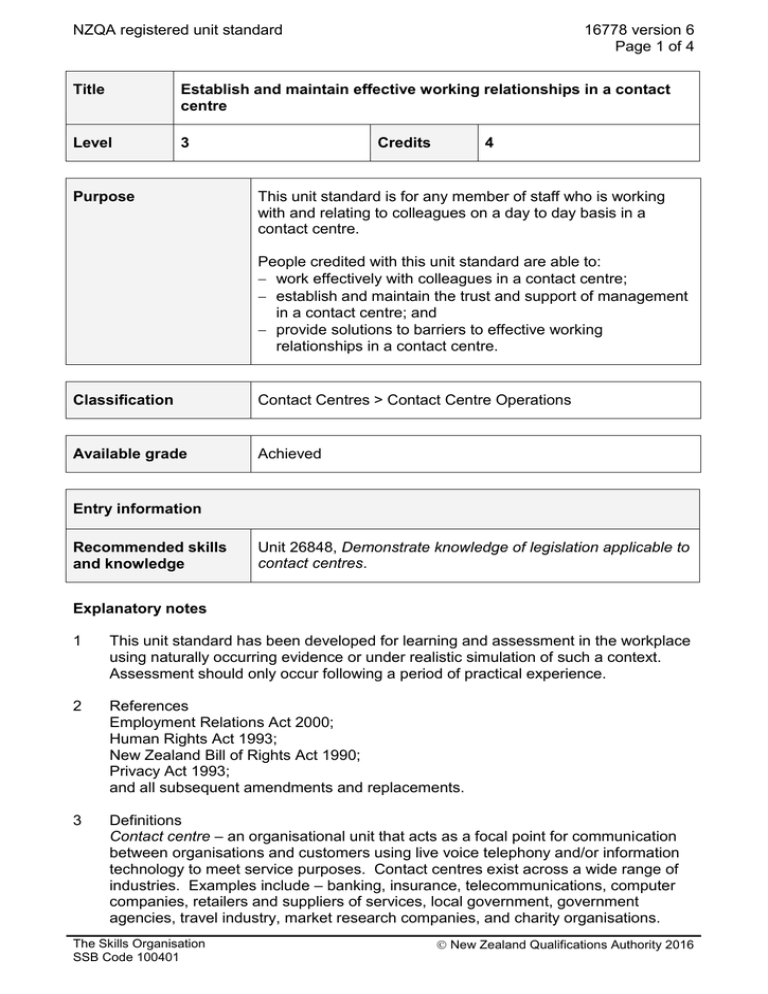
NZQA registered unit standard 16778 version 6 Page 1 of 4 Title Establish and maintain effective working relationships in a contact centre Level 3 Purpose Credits 4 This unit standard is for any member of staff who is working with and relating to colleagues on a day to day basis in a contact centre. People credited with this unit standard are able to: work effectively with colleagues in a contact centre; establish and maintain the trust and support of management in a contact centre; and provide solutions to barriers to effective working relationships in a contact centre. Classification Contact Centres > Contact Centre Operations Available grade Achieved Entry information Recommended skills and knowledge Unit 26848, Demonstrate knowledge of legislation applicable to contact centres. Explanatory notes 1 This unit standard has been developed for learning and assessment in the workplace using naturally occurring evidence or under realistic simulation of such a context. Assessment should only occur following a period of practical experience. 2 References Employment Relations Act 2000; Human Rights Act 1993; New Zealand Bill of Rights Act 1990; Privacy Act 1993; and all subsequent amendments and replacements. 3 Definitions Contact centre – an organisational unit that acts as a focal point for communication between organisations and customers using live voice telephony and/or information technology to meet service purposes. Contact centres exist across a wide range of industries. Examples include – banking, insurance, telecommunications, computer companies, retailers and suppliers of services, local government, government agencies, travel industry, market research companies, and charity organisations. The Skills Organisation SSB Code 100401 New Zealand Qualifications Authority 2016 NZQA registered unit standard 16778 version 6 Page 2 of 4 CSR – Customer Service Representative. Also known as agent, customer care consultant, customer service operator, call centre operator or account manager. Cultural diversity – may include but is not limited to – age, gender, diversity within races, sexual orientation, special needs, and religion. KPI – Key Performance Indicator. Management – the employee who is directly in charge of the work at the place where it is performed; this could include – manager, superintendent, team leader or authorisation holder, division or department head. Organisational procedures – those policies, procedures, and/or guidelines of a real workplace or, in the case of assessment being undertaken in a simulated workplace, they are those of a real workplace that reflect the policies and procedures of the workplace rather than those of the training provider. Personality types – the psychological classification of different types of individuals. 4 Range All activities and evidence presented for outcomes and evidence requirements in this unit standard must be in accordance with organisational procedures. Outcomes and evidence requirements Outcome 1 Work effectively with colleagues in a contact centre. Evidence requirements 1.1 Establish and maintain effective working relationships with colleagues in a contact centre. Range open, honest, friendly, co-operative, reliable, punctual, team-work, peer support. 1.2 Exchange information and opinions with peers and colleagues, and deal with any difference of opinion. 1.3 Communications are clear, accurate, and complete. Range 1.4 Honour promises and undertakings to others within realistic timeframes, while taking account of other priorities and commitments. Range 1.5 respectful, personal, and organisational values considered, diplomatic. personal, one-to-one, one-to-group. Listen to and consider views of others. Range paraphrase, summarise, body language. Outcome 2 Establish and maintain the trust and support of management in a contact centre. The Skills Organisation SSB Code 100401 New Zealand Qualifications Authority 2016 NZQA registered unit standard 16778 version 6 Page 3 of 4 Evidence requirements 2.1 Inform and/or update management about activities, progress, results, achievements, and performance. performance may include but is not limited to – product, service, personal, personnel, plant, process, KPIs. Range 2.2 Obtain policy and procedural information from management as required to maintain the agreed levels of performance. Range 2.3 standards of performance, rules and regulations, instructions, work orders, code of conduct. Resolve disagreements in the workplace without causing disruption or damage to the relationship. Range 2.4 CSR-CSR, CSR-manager. Follow and maintain agreed communication procedures. Range internal and/or external customer, written, verbal, electronic. Outcome 3 Provide solutions to barriers to effective working relationships in a contact centre. Range barriers may include but are not limited to – cultural diversity, leadership styles, personality types, staff rosters, conditions of employment. Evidence of three is required. Evidence requirements 3.1 Describe barriers to effective working relationships. 3.2 Explain consequences of ineffective working relationships. 3.3 Describe solutions to working relationship barriers. Planned review date 31 December 2018 Status information and last date for assessment for superseded versions Process Version Date Last Date for Assessment Registration 1 25 July 1999 31 December 2011 Review 2 25 February 2000 31 December 2011 Revision 3 3 April 2001 31 December 2011 The Skills Organisation SSB Code 100401 New Zealand Qualifications Authority 2016 NZQA registered unit standard 16778 version 6 Page 4 of 4 Process Version Date Last Date for Assessment Review 4 26 July 2005 31 December 2012 Review 5 9 December 2010 31 December 2017 Review 6 17 April 2014 N/A Consent and Moderation Requirements (CMR) reference 0121 This CMR can be accessed at http://www.nzqa.govt.nz/framework/search/index.do. Please note Providers must be granted consent to assess against standards (accredited) by NZQA, before they can report credits from assessment against unit standards or deliver courses of study leading to that assessment. Industry Training Organisations must be granted consent to assess against standards by NZQA before they can register credits from assessment against unit standards. Providers and Industry Training Organisations, which have been granted consent and which are assessing against unit standards must engage with the moderation system that applies to those standards. Requirements for consent to assess and an outline of the moderation system that applies to this standard are outlined in the Consent and Moderation Requirements (CMR). The CMR also includes useful information about special requirements for organisations wishing to develop education and training programmes, such as minimum qualifications for tutors and assessors, and special resource requirements. Comments on this unit standard Please contact The Skills Organisation reviewcomments@skills.co.nz if you wish to suggest changes to the content of this unit standard. The Skills Organisation SSB Code 100401 New Zealand Qualifications Authority 2016
